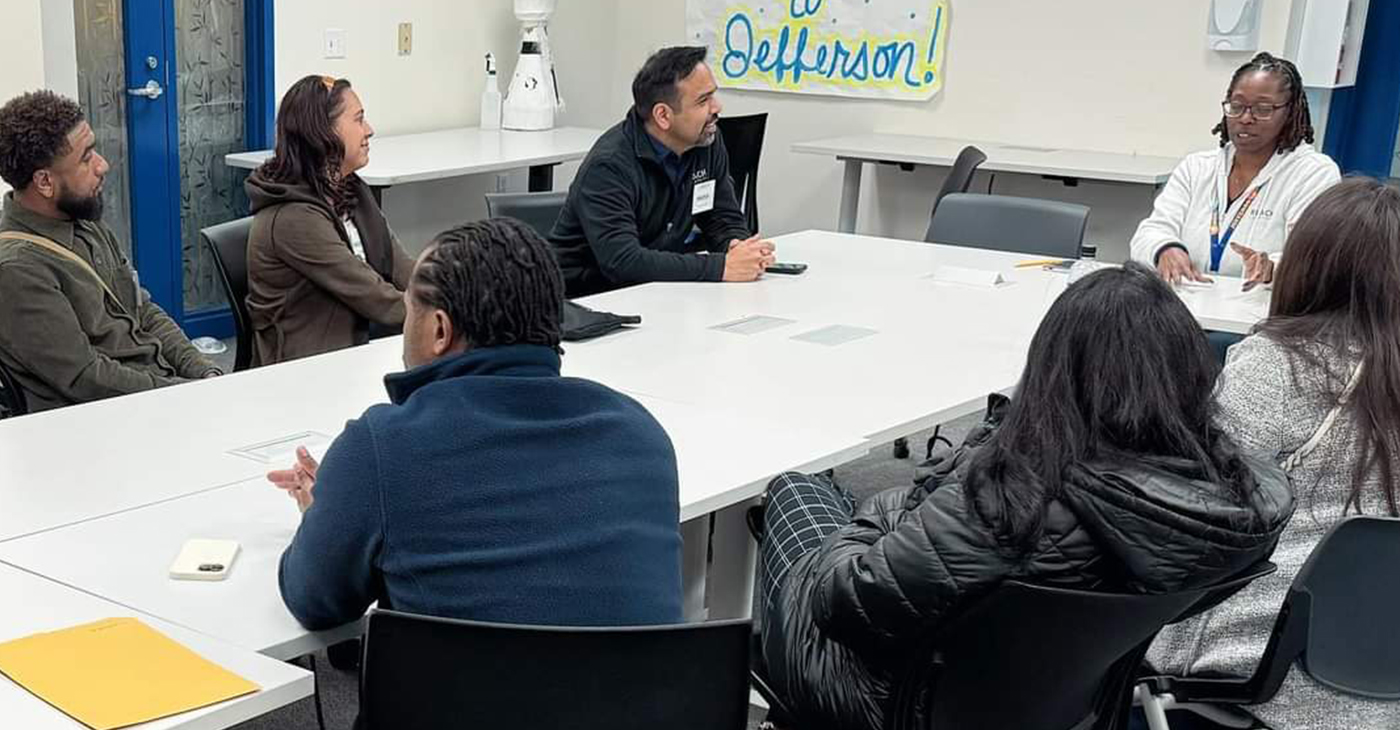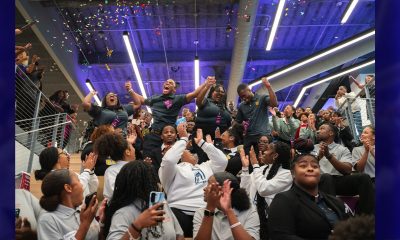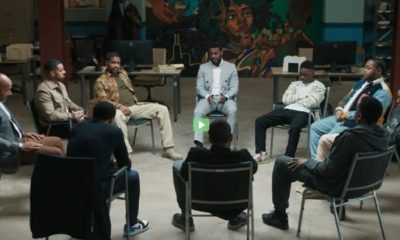Education
Homeless teen who graduated valedictorian finds a home at TSU
NASHVILLE PRIDE — When Tennessee State University President Glenda Glover traveled to her hometown of Memphis on Wednesday, she had one goal in mind: Bring back Tupac Moseley. Moseley had recently graduated valedictorian of his class at Raleigh-Egypt High School, and received $3 million in scholarships, all while homeless his senior year. This hands-on treatment didn’t go unnoticed by the shy teen.
By Pride Newsdesk
When Tennessee State University President Glenda Glover traveled to her hometown of Memphis on Wednesday, she had one goal in mind: Bring back Tupac Moseley. Moseley had recently graduated valedictorian of his class at Raleigh-Egypt High School, and received $3 million in scholarships, all while homeless his senior year. This hands-on treatment didn’t go unnoticed by the shy teen.
“For the president herself to drive down to one of the schools to actually assist a student personally, one-on-one, to take him or her up there for a visit, it’s just mind-blowing to me,” said Moseley, who will major in engineering.
President Glenda Glover personally led a team of senior university officials to Memphis and presented Moseley with a full-ride scholarship, including housing and a meal plan.
“Tupac is not homeless anymore,” Glover said to the throng of media representatives and a cheering crowd assembled in the school cafeteria during a celebration for the teen. “He now has his own room with a meal plan with all the necessary amenities to help him continue his success as an academically talented student. That’s what we do. We are an HBCU, we care about our students. It is in our DNA that we can see a student with this much potential and talent and see what we can do to assist him even before he starts his academic journey.”
Moseley’s remarkable story of perseverance and success amidst homelessness and poverty has made national headlines. The 18-year-old became homeless in his senior year after his father died and the family could not afford the mounting bills. They moved to a campsite for the disadvantaged. In the midst of the hardship, the Memphis native found a way to stay focused in school, and “staying on top of everything that came his way in class work,” his high school principal said. He graduated with a 4.3 grade point average.
“Tupac is an amazing individual with excellent math knowledge,” said principal Shari Meeks. “He has taken the highest-level math here that we offer. He has attained college credits. He took a statewide dual credit challenge test in pre-calculus and passed it. He could have gone to any school in the nation. I think TSU will have an asset in Tupac. He is awesome and revered by his classmates. He helps them, he tutors them.”
At a sendoff reception for Moseley in the principal’s conference room, the standing room only audience included state and county Who’s Who, such as State Rep. Antonio Parkinson (District 98), who was instrumental in the TSU/Moseley talks and Dr. Joris M. Ray, superintendent of Shelby County Schools.
Parkinson described Moseley as the “best and brightest talent that has ever been produced in Shelby County.”
“This is just the culmination of a lot of things that’s been going on,” Parkinson said about the reception. “Losing his father, homelessness, that was just too much for anyone. What we have done is just pull resources together to make sure that we provide the stability for him and Tennessee State University was part of the strategy to create that stability for one of our best and brightest talents.”
Superintendent Ray was thankful for the support system at the school, including: principal, teachers, and counselors.
“This young man is a testament of being very resilient and strong,” Ray said. “I am so proud of his hard work, dedication, and he defied the odds with a great support system here at school that helped him to overcome and achieve in the midst of turmoil. I am so proud of Tupac, what he has done here, what he has done for our city and school district.”
As a way of telling his story and helping others facing hardship, Moseley created his own T-shirt based on his quote, “Your location is not your limitation.” He earned 50 scholarships worth a total of $3 million. He said he is majoring in engineering “because I love the smiles I get after helping people with tech issues.”
Moseley is not coming to TSU alone. Two other fellow graduates, including his best friend, Brandon Fontaine, also received scholarships and will attend TSU with him. President Glover included them in the trip back to campus on Wednesday as well. Fontaine is considering majoring in business management or mechanical engineering. The other student, Natoriya Owens, who wants to pursue a career in entrepreneurship, will major in theater arts with a minor in business.
President Glover added that this is what makes HBCUs so special for African Americans, and particularly first-generation college students and communities of color.
“This is the type of hands-on, special attention TSU provides our students, and especially those with unusual circumstances. It also speaks to the holistic approach and nurturing that HBCUs provide to students. Tupac is a prime example of the role TSU and other HBCUs play in addressing the total needs of our students.”
Tennessee State University is currently accepting students for the fall and has scholarships available for qualified students who want to major in STEM.
This article originally appeared in the Nashville Pride.
Activism
Oakland Schools Honor Fred Korematsu Day of Civil Liberties
Every Jan. 30, OUSD commemorates the legacy of Fred Korematsu, an Oakland native, a Castlemont High School graduate, and a national symbol of resistance, resilience, and justice. His defiant stand against racial injustice and his unwavering commitment to civil rights continue to inspire the local community and the nation. Tuesday was “Fred Korematsu Day of Civil Liberties and the Constitution” in the state of California and a growing number of states across the country.

By Post Staff
Every Jan. 30, OUSD commemorates the legacy of Fred Korematsu, an Oakland native, a Castlemont High School graduate, and a national symbol of resistance, resilience, and justice.
His defiant stand against racial injustice and his unwavering commitment to civil rights continue to inspire the local community and the nation. Tuesday was “Fred Korematsu Day of Civil Liberties and the Constitution” in the state of California and a growing number of states across the country.
One OUSD school is named in his honor: Fred T. Korematsu Discovery Academy (KDA) elementary in East Oakland.
Several years ago, founding KDA Principal Charles Wilson, in a video interview with anti-hate organization “Not In Our Town,” said, “We chose the name Fred Korematsu because we really felt like the attributes that he showed in his work are things that the children need to learn … that common people can stand up and make differences in a large number of people’s lives.”
Fred Korematsu was born in Oakland on Jan. 30, 1919. His parents ran a floral nursery business, and his upbringing in Oakland shaped his worldview. His belief in the importance of standing up for your rights and the rights of others, regardless of race or background, was the foundation for his activism against racial prejudice and for the rights of Japanese Americans during World War II.
At the start of the war, Korematsu was turned away from enlisting in the National Guard and the Coast Guard because of his race. He trained as a welder, working at the docks in Oakland, but was fired after the bombing of Pearl Harbor in 1941. Fear and prejudice led to federal Executive Order 9066, which forced more than 120,000 Japanese Americans out of their homes and neighborhoods and into remote internment camps.
The 23-year-old Korematsu resisted the order. He underwent cosmetic surgery and assumed a false identity, choosing freedom over unjust imprisonment. His later arrest and conviction sparked a legal battle that would challenge the foundation of civil liberties in America.
Korematsu’s fight culminated in the Supreme Court’s initial ruling against him in 1944. He spent years in a Utah internment camp with his family, followed by time living in Salt Lake City where he was dogged by racism.
In 1976, President Gerald Ford overturned Executive Order 9066. Seven years later, the 9th Circuit Court of Appeals in San Francisco vacated Korematsu’s conviction. He said in court, “I would like to see the government admit that they were wrong and do something about it so this will never happen again to any American citizen of any race, creed, or color.”
Korematsu’s dedication and determination established him as a national icon of civil rights and social justice. He advocated for justice with Rosa Parks. In 1998, President Bill Clinton gave him the Presidential Medal of Freedom saying, “In the long history of our country’s constant search for justice, some names of ordinary citizens stand for millions of souls … To that distinguished list, today we add the name of Fred Korematsu.”
After Sept. 11, 2001, Korematsu spoke out against hatred and discrimination, saying what happened to Japanese Americans should not happen to people of Middle Eastern descent.
Korematsu’s roots in Oakland and his education in OUSD are a source of great pride for the city, according to the school district. His most famous quote, which is on the Korematsu elementary school mural, is as relevant now as ever, “If you have the feeling that something is wrong, don’t be afraid to speak up.”
Community
Teacher Mentoring Program Receives James Irvine Leadership Award
Leaders at Oakland-based Reach University, Dr. Elizabeth Baham and Héctor Camacho Jr, have been honored with the James Irvine Leadership Award for their work on addressing California’s teacher shortage through job-embedded curriculum and credential programs. With the award, each organization receives a grant of $350,000 and additional resources.

By Magaly Muñoz
Leaders at Oakland-based Reach University, Dr. Elizabeth Baham and Héctor Camacho Jr, have been honored with the James Irvine Leadership Award for their work on addressing California’s teacher shortage through job-embedded curriculum and credential programs. With the award, each organization receives a grant of $350,000 and additional resources.
Dr. Baham and Mr. Camacho, who have been at Reach for nine years and two years respectively, have been instrumental in attracting and recruiting future educators who otherwise would not have a clear and affordable path into teaching or leadership positions.
Established in 2006, Reach University has served as the nation’s first and only accredited nonprofit university, dedicated to advancing undergraduate and graduate degrees and credentials.
“To be recognized for this work so publicly, has given me more strength to keep [fighting] because it’s a lot of work. I’m super honored and appreciative of [the James Irvine Foundation] for giving me this new burst of energy because it’s a tough field,” Camacho said.
Baham echoed Camacho’s sentiments and is grateful that the work they are doing is being recognized by a larger audience.
“It’s an acknowledgement of the work that I’ve put in and it’s an acknowledgement that teachers matter, that education matters. I think that at the end of the day, people see both Hector and I representing Reach University and they walk away with a sense of teaching matters,” Baham said.
The university primarily partners with K-12 school districts to provide potential teacher candidates who specialize in subjects such as liberal arts, math, science of reading, and computer science.
Camacho, Dean of Admissions and SVP of Workforce Development, praised the university’s methodology in allowing candidates already employed in a school either part or full time, as a teacher-aides or paraprofessionals, to earn college credit while mastering the art of teaching.
Camacho highlighted the challenges that many face when seeking higher education, such as taking a break from school to work and afford their degree or going directly into college and amassing large amounts of debt to solely focus on their studies.
“Let’s honor and recognize the work that they’re doing in the schools right now. Give them some college credit and then give them the other coursework they need to finish it because we know you shouldn’t have to choose anymore,” Camacho said.
Students at Reach University are paid to earn a degree, and undergraduates take on zero student debt. After grants and institutional scholarships, the out-of-pocket contribution for all full-time undergraduate candidates is $900 per year, or $75 per month, with no student debt, according to Reach officials.
Half of the program candidates are made up of people of color, matching the demographics of the schools they are working in. The large majority are also first-generation college students and some from low-income backgrounds.
Baham, Provost & Chief Academic Officer, stated the importance of having educators of color in classrooms because it not only allows for students of color to see themselves in authority positions, but also integrates what the world looks like for those who are not surrounded by diversity in their everyday lives.
She added that diversity at all levels of academia results in success and encouragement for everyone to strive for more.
“It’s important for [students] to see us occupying spaces where they will want to see themselves,” Baham said.
Reach students are taught in group setting classrooms twice a week and through one-on-one mentoring to better assist with individual needs. This approach allows students to network with other classmates to problem-solve similar obstacles and receive personalized coaching to refine their teaching skills.
With job-embedded curriculum being the set form of learning for Reach, many of the students have a clearer transition from degree to career pipeline. 84% of California alumni are still in the classroom five years after completing the graduate program and nearly 91% are still working in a school.
Tysha Hayes, a Reach student, works as a bus driver for Jefferson Union High School District and part-time in the classroom as a part of her degree program. She entered the university in fall 2023 and is hoping to graduate by 2027.
Hayes shared that the non-traditional learning aspect of Reach is what drew her to enroll, as she herself has had an unconventional journey from being a bus driver for 27 years to pursuing a career in education.
The job allows Hayes to be involved in her students’ lives in a more personal way. She explained that her face is the first and last one they see on their way back and forth to school, often prompting them to share their classroom frustrations and struggles with her.
“The bus has been my classroom with the students, so I get the best of both worlds. I get to see them in different elements throughout the whole day,” Hayes said.
Post-graduation, Hayes intends to work in health and wellness so that she can help guide and assist students who are feeling overwhelmed or unmotivated in their education to work through their struggles and strive for more.
Hayes says although she got a late start in life, the prospect of building interpersonal relationships with her students in and outside the classroom excites her to keep working towards her degree.
California Black Media
Yahushua’s Law: Senate Advances Bill to Protect Students from Extreme Weather
In a significant move towards student safety, the California Senate Education Committee passed Senate Bill (SB) 1248, also known as Yahushua’s Law, on April 3. The bill is named in memory of Yahushua Robinson, a 12-year-old student from Lake Elsinore, who tragically died due to a heat-related illness during a physical education class in 2023. It is a pioneering effort to prevent similar incidents in the future.

By California Black Media
In a significant move towards student safety, the California Senate Education Committee passed Senate Bill (SB) 1248, also known as Yahushua’s Law, on April 3.
The bill is named in memory of Yahushua Robinson, a 12-year-old student from Lake Elsinore, who tragically died due to a heat-related illness during a physical education class in 2023. It is a pioneering effort to prevent similar incidents in the future.
Authored by Senator Melissa Hurtado (D-Bakersfield) and co-authored by Assemblymember Akilah Weber, M.D. (D-La Mesa), SB 1248 directs the California Department of Education to develop comprehensive guidelines for schools regarding student activity during all extreme weather conditions.
“No student should ever lose their life on campus to extreme weather when we can take steps to protect them by preparing statewide plans to minimize exposure to the most harmful elements of exposure,” Hurtado said after introducing SB 1248.
The bill stipulates that schools must implement safety measures which include monitoring weather forecasts, postponing or relocating outdoor activities during hazardous conditions, and ensuring students have proper hydration and access to shade. It also requires schools to establish clear communication plans to keep parents, teachers, and students informed about potential weather hazards.
Supporters of the bill include the Robinson family, advocate Christina Laster, Bold Enterprises LLC, California Black Women’s Collective Empowerment Institute, Familias Empoderadas del Valle Central National Action Network, The Black Student Advocate, and the Ventura County Alumnae Chapter of Delta Sigma Theta Sorority.
Thanking Hurtado for introducing this crucial legislation, Weber said, “The story of Yahushua Robinson last year was heartbreaking. We have protections for farm workers and other industries in the case of extreme weather, now climate change is forcing us to also extend similar protections to students at school.”
-

 Activism4 weeks ago
Activism4 weeks agoOakland Post: Week of March 20 – 26, 2024
-

 #NNPA BlackPress3 weeks ago
#NNPA BlackPress3 weeks agoCOMMENTARY: D.C. Crime Bill Fails to Address Root Causes of Violence and Incarceration
-

 #NNPA BlackPress3 weeks ago
#NNPA BlackPress3 weeks agoMayor, City Council President React to May 31 Closing of Birmingham-Southern College
-

 #NNPA BlackPress3 weeks ago
#NNPA BlackPress3 weeks agoCOMMENTARY: Lady Day and The Lights!
-

 #NNPA BlackPress3 weeks ago
#NNPA BlackPress3 weeks agoFrom Raids to Revelations: The Dark Turn in Sean ‘Diddy’ Combs’ Saga
-

 #NNPA BlackPress3 weeks ago
#NNPA BlackPress3 weeks agoBaltimore Key Bridge Catastrophe: A City’s Heartbreak and a Nation’s Alarm
-

 #NNPA BlackPress3 weeks ago
#NNPA BlackPress3 weeks agoBaltimore’s Key Bridge Struck by Ship, Collapses into Water
-

 Activism3 weeks ago
Activism3 weeks agoOakland Post: Week of March 27 – April 2, 2024





















































4 Comments